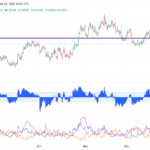LONDON: The pound traded at its highest in over three years on Friday, heading for its largest weekly gain against the dollar since early April, thanks in part to unexpectedly robust UK retail sales data and to ongoing investor unease around US assets.
Sunny weather boosted British consumer spending in April. Retail sales volumes jumped by 1.2% month-on-month, the Office for National Statistics said on Friday after a downwardly revised 0.1% increase in March. Economists had forecast a rise of 0.2%.
Sterling has gained 1.5% this week and on Friday hit a high of $1.3468, the most since February 24, 2022, when Russia invaded Ukraine, sparking a global flood of money into safe-havens like the dollar.
Just over three years later and the investor nervousness about the outlook for the global economy that would normally have funnelled cash into the dollar is sucking capital out of US markets, which are now the epicentre of the uncertainty.
US President Donald Trump’s erratic application of hefty tariffs on trading partners – even with the pauses and outlines of deals that have ensued – have generated the most uncertainty among investors in years.
To boot, Trump’s sweeping tax and spending bill that will strain US government finances even further by adding trillions of dollars in debt, has made investors wary of long-dated government bonds, even those outside elsewhere, such as UK gilts.
Higher gilt yields have made sterling more attractive to non-UK investors, but the concerns around public finances mean Britain has the highest government borrowing rates in the developed world, with 30-year gilt yields topping 5.5% on Friday, despite news that energy bills were set to drop.
“This is a sign that the market remains wary of lending to the UK while the government still does not have control of public spending, even if the decline in the energy price cap is adding downward pressure on short term yields this morning,” Kathleen Brooks, XTB research director, said.
“The bond market has dictated UK fiscal policy before, and it could do so again now that bond markets remain volatile.”




















